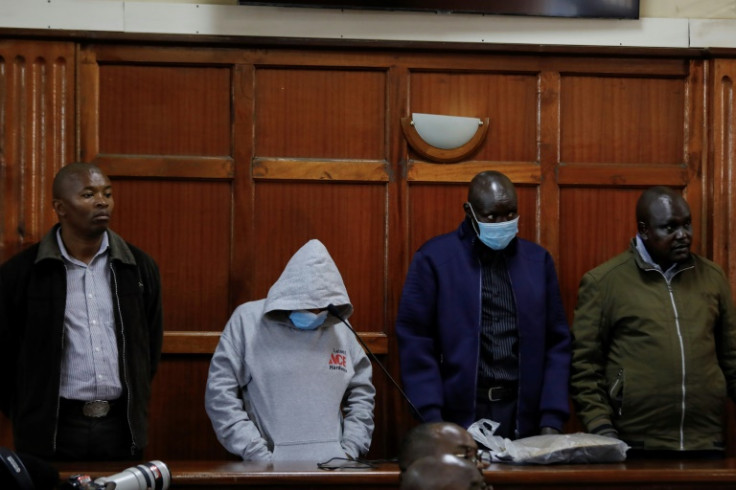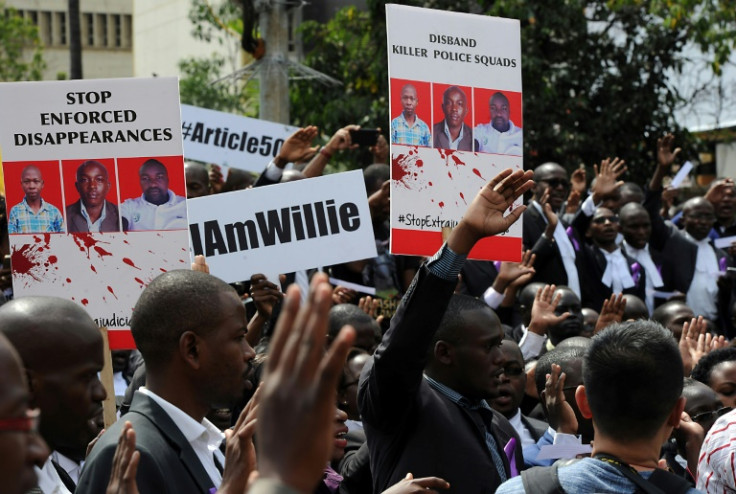Kenyan Police Sentenced For Murder Of Rights Lawyer

Three Kenyan police officers were on Friday given sentences ranging from 24 years in jail to the death penalty for the brutal murder of a rights lawyer and two other people.
The bodies of lawyer Willie Kimani -- who had criticised police abuse -- as well as his client Josephat Mwenda and driver Joseph Muiruri were found wrapped in sacks and dumped in a river outside Nairobi in June 2016.
The torture and killing of the three men sparked furious protests in Kenya, where many people fear the police.
In July last year, High Court judge Jessie Lessit found the three officers, including a woman, as well as a police informer guilty of murder. A fourth policeman was acquitted.
Lessit on Friday sentenced former policeman Fredrick Leliman to death while his colleagues were sentenced to 24 and 30 years in prison.
The informer was given a 20-year term.
"This was a most foul murder and execution that was most heinous," Lessit told the packed courtroom.
She singled out Leliman for acting "in flagrant abuse of his office" and masterminding the murder "in a sophisticated master plan".
Cliff Ombeta, a lawyer for the three officers, told AFP that they would all appeal the sentence.
"This judgment cannot stand the test of any court of appeal judges," he said.
Kimani had been defending a motorbike taxi driver who accused Leliman of shooting him for no reason at a traffic stop in 2015.
When the authorities found his body, Kimani's wrists were bound with rope, three of his fingers had been chopped off and his eyes appeared to have been gouged out.
The victims' families and rights groups hailed the sentencing for standing up to unchecked police brutality.
"We are happy and Kimani can finally rest in peace. Along the way, we had lost hope that we would get justice," Kimani's wife Hannah said, holding back tears.
"This is a great start to the building of a culture of police accountability. The tolerance for rogue police officers is over," Amnesty International's Kenya director Irungu Houghton said on behalf 20 rights groups advocating for police reforms.
The International Justice Mission (IJM), the global legal aid group which Kimani worked for, said it had hoped for higher sentences after 185 court hearings but were nonetheless "happy that justice has been found".
Extrajudicial killings are rife in Kenya, and justice is rare with few examples of police being held to account.
Missing Voices, a campaign group focused on extrajudicial killings in the country, said the sentences showed the justice system "can be trusted to deliver justice for victims of police criminality".
Police have been accused of running hit squads targeting people -- including activists and lawyers -- who investigate alleged rights abuses by officers.
In October, Kenya's new President William Ruto disbanded a feared 20-year-old police unit accused of extrajudicial killings and vowed an overhaul of the security sector.
Prosecutors also announced in October they would charge police with crimes against humanity over a deadly crackdown on post-election protests in 2017, a landmark decision hailed by the UN's rights chief Volker Turk.
The charges cover rape, murder and torture and include the case of a six-month-old baby girl whose death became a symbol of police brutality during the bloody election aftermath.
Kenya's parliament established the International Police Oversight Authority (IPOA) in 2011 to provide civilian scrutiny of a powerful institution also reputed to be among the country's most corrupt.
Only a handful of officers have been convicted as a result of IPOA investigations, even though the watchdog has examined more than 6,000 cases of alleged police misconduct, according to data covering the period from its inception to June 2020.
Activists largely defend the IPOA's record, saying police often frustrate inquiries by refusing to cooperate.
Although the death penalty is still handed out, Kenya has not carried out an execution after 1987.

© Copyright AFP 2024. All rights reserved.





















